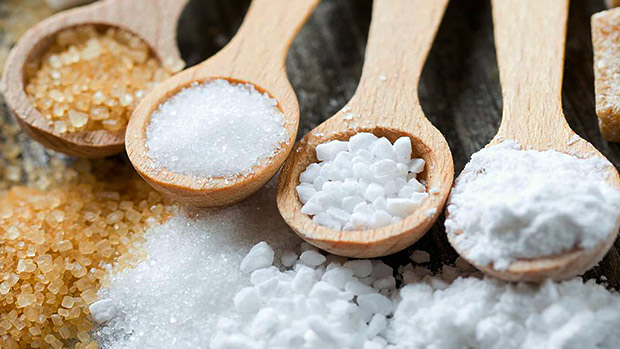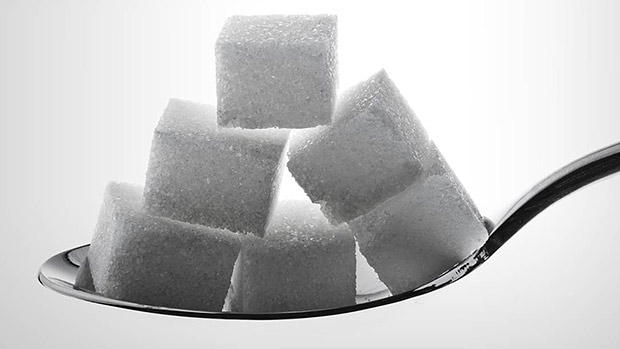Sugar Made Me Do It!
Pssst. Yeah, I'm talking to you. Have you ever, maybe after walking out of one of those Lululemon stores and seeing all those gluteally endowed sales people (and maybe mannequins, too), gone home and engaged in a little, you know, solitary sin?
If you have, it's not your fault. You're no pervert. It's the sugar that made you do it.
At least that's what they used to think. In the 18th century, British author Jonas Hanway wrote that sugar created "fantastic desires and bad habits in which nature has no part," which is a polite, English, high-society way of saying that sugar makes you want to rub one out.
The demonization of sugar continued on into the next century, when, in 1852, physician James Redfield argued that sugar, processed sugar in particular, was responsible for all kinds of moral failings. He thought each phase of sugar processing was a "stage in the downhill course of deception and mockery, of cowardice, cruelty, and degradation."
As such, he concluded that animals that lived on honey, like the bee, hummingbird, or bear, were brave and cautious, while those that preferred sugar lacked integrity, "as, for example, the housefly and the ant that lives in the sugar bowl."
Thirty years after Redfield made his candied zoological observations, John Harvey Kellog, the guy responsible for the grrreat Frosted Flakes in your cupboard, was back to linking sugar with improper thoughts and desires, insisting that sugar excited the genital organs.
But that was then. We're far more scientifically sophisticated nowadays. Sure. No longer do we link sugar with the impulse to pleasure yourself. Instead, we link it to the criminal mind, murder, and maybe even Nazism (Jerome Rodale, 1968). We think it's toxic, evil, poisonous, even addictive – brother to alcohol, tobacco, cocaine, and heroin (Robert Lustig, 2013).
Sugar is even believed to cause hyperactivity in children, along with diabetes and cancer. So afraid are we of sugar in general that some otherwise reasonable people now tend to avoid fruit, lest the sweet demon possess them and bring them to physical ruin.
What in the world of sweet-tasting carbohydrates is going on? Sugar doesn't lead to, or cause, any of the things listed above. In moderation, it's a fairly innocuous and downright pleasurable foodstuff.
Let's look at each of these more modern accusations and see if there's even a shred of merit to them, but first, let's define exactly what we're talking about when the topic is sugar.
Much the same as 19th century physician James Redfield, we tend to ascribe different levels of evilness to different kinds of sugar, with white, refined sugar (sucrose) being regarded as the worst.
What we need to remember is that all carbohydrates are sugar and that all carbohydrates, whether they be oatmeal, sweet potato, or table sugar, get broken down (hydrolyzed) in the digestive tract into the same three molecules:
- Glucose
- Fructose
- Galactose
The only difference, as far as your body is concerned, are 1) that some carbs are more easily digested while others (fiber) resist digestion, and 2) fructose is metabolized almost solely by the liver, while glucose is dumped directly into the bloodstream and transported directly to all tissues.
About 41% of fructose is also converted into glucose within 3-6 hours. The rest of it is oxidized, converted to lactate, or converted to glycogen and stored. Less than 1% is converted to plasma triglycerides, or fat. And all those fructose studies that cited liver damage and fatness? Most of them used amounts as high as 315 grams of fructose a day, which is equal to about 45 bananas.
But the important point remains: All carbs, in the end, are pretty much equal; their digestive end products are the same. Table sugar is no more "evil" than any other type of carbohydrate; it's just more concentrated and easier to digest.
Despite the widespread belief that sugar causes diabetes, there's no one-to-one correlation between sugar and diabetes. Even The American Diabetes Association agrees. Sure, they recommend that you avoid marinating yourself with Mountain Dew all day, but there's little evidence to prove that moderate amounts of sugar will cause diabetes.
That being said, a diet high in simple sugars and simple carbs can increase insulin resistance over time, thus leading to Type 2 diabetes, but that's entirely different than the direct cause/effect pattern touted by most decriers of sugar.
Additionally, brand-spanking new research has shown that high-fat, high-carb, high-calorie meals (junk food) can have an inflammatory effect on the gut, allowing proteases (protein-eating enzymes) to leak through, enter the bloodstream, and "digest" insulin receptors on blood cells.
This effect, if repeated often enough by continuing to eat poorly, could then result in Type 2 diabetes, but again, the culprit isn't specifically sugar.

Back in 1923, a German scientist named Otto Warburg did some experiments and concluded that cancer cells were ravenous for glucose. This has led to the belief – at least among those who think modern cancer treatments are one giant conspiracy – that people who have cancer should avoid all carbs, particularly simple sugars.
Now it's true that cancer cells take sugar (glucose) from the bloodstream for fuel, as do all the cells in our body. We of course provide that sugar from any and all carb-containing foods.
But cancer is a tricky bastard. Eating less sugar will force the body to use other resources to make sugar, which in turn will continue to feed cancer cells. If, on the other hand, you somehow prevent cancer cells from getting sugar, the cancerous cells will metabolize something else, like glutamine. If you in turn block them from getting glutamine, they may well use fatty acids.
Defeating cancer, unfortunately, isn't so easy.
Besides, many, many cancer patients die, not from the disease itself, but the wasting that accompanies it. Cancer patients often lose their appetites and taste for almost any food, so the need for calories of any kind often surpasses the worry about where those calories are coming from.
There is, however, a link between cancer and obesity, so if you eat lots and lots of calories from sugar, create insulin resistance, and eventually grow fat, your fat cells will cause inflammation through the hormones they produce, and that inflammation may indeed damage DNA and lead to cancer.
Furthermore, cancer cells do seem to love insulin itself, as many patients who develop cancer seem to have elevated insulin levels before diagnosis. But a direct link between sugar itself and cancer? Sorry, no.
Parents almost universally believe that sugar causes hyperactivity in their kids. Don't you dare give little Grayson and little Khaleesi those Jolly Ranchers because they'll start acting like tiny Somali pirates hopped up on khat, plundering the living room and holding the cat for ransom.
The belief seems to stem from a letter (not a paper, a letter) written in 1974 to the journal Pediatrics. In it, the doc called sugar a "leading cause of hyperactivity." Ask the National Institute of Mental Health, though, and they insist "more research discounts this idea than supports it."
This alleged hyperactivity might just be a case of extreme excitement that children are prone to anyhow, in this case prompted by some delicious candy. Any dad could probably elicit the same excitement from his kid by announcing a trip to Disneyland, or even burping out the entire Baby Shark song.
Sugar may give kids cavities and teach them to prefer sweets to more nutritious foods, but there just isn't any evidence that it wires them up.
Let me say this: No one has ever pimped out their kid sister for a Twinkie. No one has ever stabbed and robbed a grocery store clerk for a box of Keebler cookies. No one has spent hours convulsing on the floor while in the throes of an Eskimo Pie detox.
People aren't addicted to sugar. They may like sugar an awful lot, but sneaking a little Haagen-Dazs in before you go to bed is a lot different than stumbling under a highway overpass to shoot some heroin.
Try telling that to Robert Lustig and his acolytes, though. They'll tell you that sugar stimulates the brain's reward center the same way alcohol, cocaine, or heroin does.
Maybe, but every pleasurable experience, from sex, to listening to great music, to seeing the gym know-it-all impale his crotch on an Olympic bar, likely lights up the same pleasure centers in the brain.
Clearly, there's something else altogether different going on when you want a cookie – it's called a craving, and not an addiction. Maybe the word "addiction" just makes people too weak-willed to push away from the dessert table feel better.
More importantly, if you brought your "sugar-addicted" child, spouse, or friend to a substance abuse specialist after doing an intervention, the specialist would force-feed you his or her leather-bound copy of the DSM-5 (Diagnostic and Statistical Manual of Mental Disorders, 5th edition).
When you cook meat, it turns brown. It's a process called the Maillard Reaction, which is simply the binding of sugars to protein. It's also virtually identical to what happens to your body when you habitually keep blood sugar levels above approximately 85 dl/mg.
If blood sugar levels are kept high enough, long enough, you're effectively slow-cooking yourself – glucose and fructose link to the amino acids in the collagen and elastin that support the skin. Pretty soon you end up looking a lot like one of those dried-up apple faces your senile aunt tries to sell at the farmer's market.
But it doesn't stop there. Soon, this glycation reaction can lead to kidney disease, joint deterioration, stiffening of connective tissues, cataracts, and atherosclerosis.
Not only does having perpetual high blood sugar cause you to slow-cook yourself, it also leads to a host of metabolic problems, including, but not limited to, insulin resistance and its hefty partner-in-arms, fat-assedness.
That being said, this biological havoc isn't just caused by sugar, but any diet that has as its cornerstone consistently large amounts (lots of calories) of high glycemic (easily digestible) foods.

All the controversy around sugar revolves around two related things: speed, as in speed of digestion, and concentration.
All forms of sugar, as mentioned earlier, get broken down into their component glucose molecules, but it takes a lot longer to break down a "starch." Suck down a Mountain Dew and glucose enters the bloodstream at a fast speed of about 30 calories per minute. Contrast that with a complex carbohydrate where glucose enters the bloodstream slowly, something like 2 calories per minute.
Plain sugar or, more accurately, sucrose, lacks chemical complexity; it's just two molecules. As such the calories are concentrated, with none of the fiber, water, protein, fats, vitamins, minerals, or polyphenols you'd find in a more complex carbohydrate like a potato, banana, or grain product.
As such, it's easy to eat a lot of sucrose. It also elicits a much more rapid and vigorous insulin response, which, if done repeatedly, can be inflammatory and lead to a whole host of metabolic problems and disease states, including diabetes, probably cancer, and definitely fatness. More likely, though, that all these problems are caused by excess calorie intake in general, of which sugar intake is simply a component.
Sure, most sedentary people who are fat or are gaining weight or fear getting fat or who have high blood sugar and high triglycerides should limit their intake of carbohydrate, especially simple sugars, and do what they can to increase insulin sensitivity (through meds, supplements, regular fasting, and exercise).
Physically active people, though, needn't bother to avoid carbs or obsessively avoid sugar. They aren't toxic. Still, as you've no doubt heard countless times, moderation is key. Here are a few guidelines for eating sugar that might come in handy:
- Maintain a healthy weight (duh!).
- Exercise (double duh!). Athletes generally eat a lot more sugar than non-athletes but have lower rates of cardiovascular disease, regardless.
- When possible, eat foods that have a low glycemic index. Yeah, sugar has a high glycemic index, meaning it causes a rapid increase in blood sugar, but no one is telling you to eat it by the shovel-full, let alone the spoonful.
- However, when sugar is combined with other low glycemic foods, the insulin response is muted. For instance, sugar by itself is a big deal; sugar on top of oatmeal, or even in a maple-syrup glazed hunk of salmon is not so big a deal.
- Don't avoid fruit because you fear sugar. That's stupid. Evolutionarily speaking, primates have bigger brains because they ate fruit. Unless you're single-handedly trying to turn the clock back on evolution and start a line of small-brained primordial monkey boys, eat your fruit.
- Do avoid drinking a lot of juices, though, as they're extremely calorie dense, lack fiber (because most of it was pulverized in the blending process), and, if drunk repeatedly, over a long time, will cause inflammation and its associated problems – which makes drinking juices not much different than drinking soft drinks.
Beyond all that, if you want to avoid sugar in all its forms, do it because you want your abs to show and because eliminating a single macronutrient (carbs) is usually easier than counting calories. Just don't avoid sucrose or carbs in general because some dietary alarmists told you that sugar was at the head of the conga-line of evils that escaped Pandora's box.
- Apple S. An Old Idea Revived: Starve Cancer to Death. The New York Times Magazine. May 12, 2016.
- Crook WG. Letter: An alternate method of managing the hyperactive child. Pediatrics. 1974 Nov;54(5):656.
- Levinovitz A. In defense of sugar - it's not to blame for everything. Quartz. June 15, 2015.
- Modestino A et al. Elevated Resting and Postprandial Proteolytic Activity in Peripheral Blood of Individuals with Type-2 Diabetes, Melliltus, With Uncontrolled Cleavage of Insulin Receptoers. J Am Coll Nutr. 2019 Aug;38(6):485-492.
- Sanchez-Lozada LG et al. How safes is fructose for persons with or without diabetes? Am J Clin Nutr. 2008 Nov;88(5):1189-90.
- Westwater M et al. Sugar addiction: the state of the science. Eur J Nutr. 2016; 55(Suppl 2):55–69.





